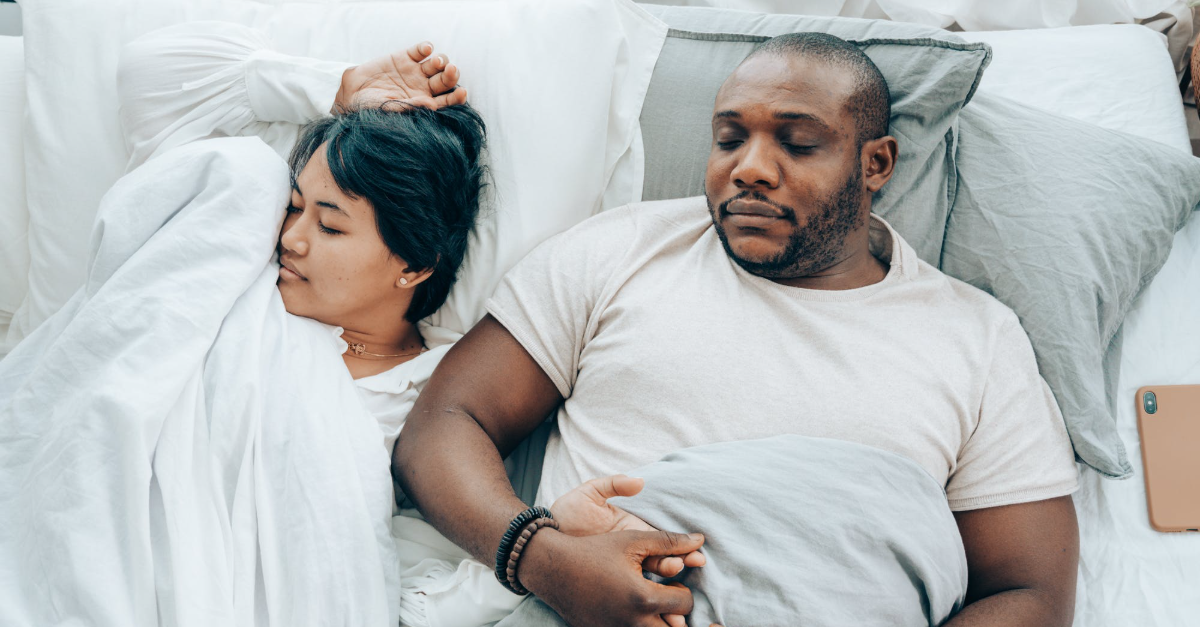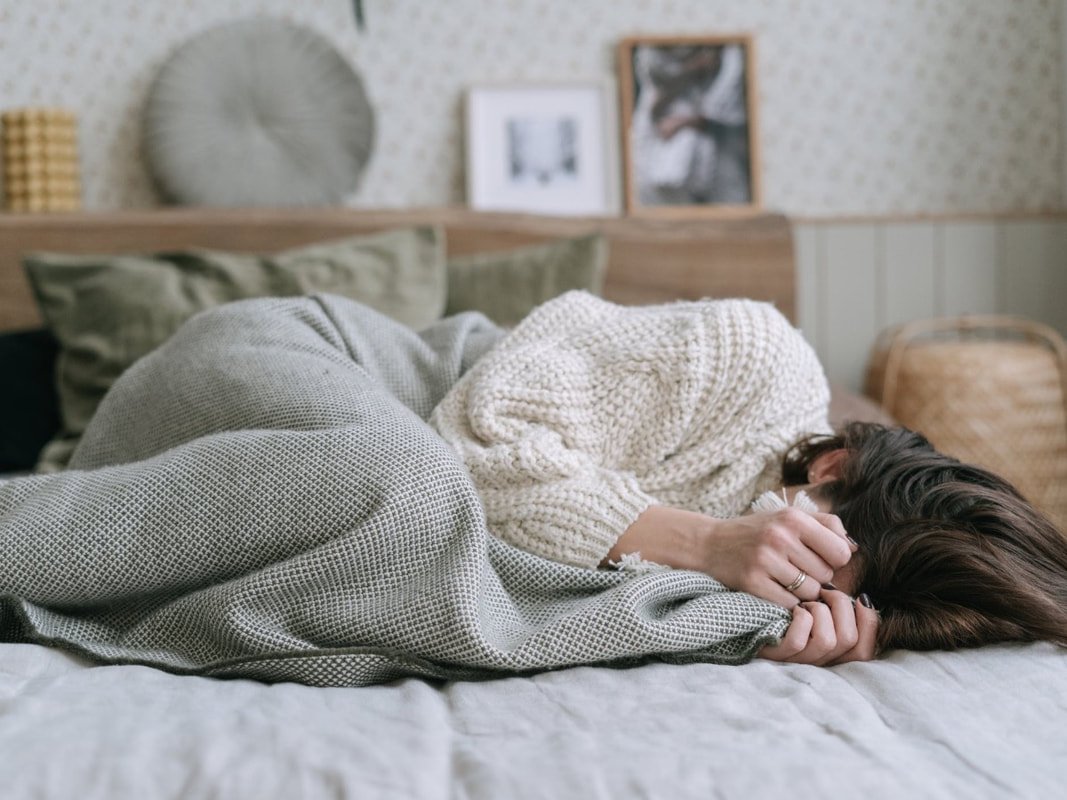Why Can’t We Sleep? Simple Steps You Can Take To Improve Your Sleep
There's nothing like a great night's sleep. We wake feeling fresh and energetic. We wake up hungry and have a clear mind. We can exercise and function well during the day. And then at night, we're ready to go back to sleep without much effort.
But, for most of us, sleep is elusive. Roughly 1/3 of U.S. adults fail to obtain the recommended eight hours of sleep per night. Without sleep, we're prone to infections and disease, hormone imbalances, weight gain, insulin resistance, and many more health conditions.
In my coaching practice, I meet many women who struggle with sleep issues including frequent night waking and insomnia—struggles that often accompany peri-menopause and menopause. And while it’s true that as we age our sleep patterns change, there is plenty we can do to support our sleep as we enter mid-life.
“Sleep loss has become an epidemic throughout industrialized nations.” - World Health Organization
Why Do We Need Sleep?
We know a lot about the importance of food, water, and reproduction as core functions of human existence, but given the value and importance of sleep—and its very basic health function—it’s surprising that scientists are only now discovering why we sleep.
There are a lot of reasons why we sleep—reasons that benefit both our brains and our bodies.
Sleep supports our ability to learn, memorize, and make decisions. When we sleep, we process the information we've collected throughout the day, sorting it into categories for analysis. Have you ever had the experience of "solving" a problem in your sleep? On many occasions, I’ve wrestled with a complicated question during the day— should I do something or not, for example— and during sleep, the answer miraculously appears in a dream!
Sleep re-calibrates our emotional brain circuits, allowing us to "cool down" and address challenges in a more effective way. When things get emotionally difficult, going to bed can have a calming effect.
Sleeping and dreaming create a space where the brain processes past knowledge and inspires creativity. Dr. Matthew Walker, sleep researcher and author of “Why We Sleep, says "dreaming is like overnight therapy." When we're in REM Sleep (the dream state), it's the only time our brain is completely free from the anxiety-triggering hormone noradrenaline. This is the hormone that produces the "fight, flight, or freeze" response to danger.
When we sleep, our body fights malignancies, infections, and sickness. During sleep, our body produces proteins and cells which fight off these assaults, and even strengthens our immune system.
Loss of sleep has been found to be a contributing factor in dementia and Alzheimer’s Disease. In fact, sleep disturbances may be an early warning sign, or possibly a contributor, of the disease as it precedes the onset by several years. Dr. Dale Bredesen, an internationally recognized expert in the mechanisms of neurodegenerative diseases, has designed a protocol to reverse cognitive decline and prevent Alzheimer’s using restorative sleep among other lifestyle practices.
Sleep regulates our appetite helping us control our body weight. Research suggests that shortening sleep to four hours for two consecutive nights disturbs endocrine function leading to obesity and weight gain by decreasing circulating leptin levels and increasing ghrelin levels, as well as self-reported hunger.
Poor sleep contributes to cardiovascular disease, while quality sleep helps improve cardiovascular health by lowering blood pressure.
The Science of Sleep
In the brain, there is a gland that produces melatonin, a hormone that modulates sleep patterns. The shape of this gland resembles a pine cone, and that's why it is called "pineal." It was once called the "Third Eye" due to its location deep in the center of the brain. The pineal gland helps us distinguish between light and dark, day and night, sunlight and moonlight.
You can think of it as the Circadian Rhythm Gland.
I used the word Circadian—so let me define it. The term "circadian" comes from the Latin word "Circa" which means "approximately" and the word "Diem" means "day."
Circadian rhythms are the biological clocks that occur in every plant, animal, and human over the course of a day. Each one of our cells contains one of these clocks and each is programmed to turn on or off thousands of genes at different times of the day or night.
And these genes influence every aspect of our health.
If our daily clocks get out of balance for as little as a day or two, our clocks can't send the right messages to our genes, and our body and mind can't function as well as we need them to.
When this disruption continues, we may get infections or develop chronic diseases… ADHD, depression and insomnia, anxiety, obesity, dementia, and even cancer.
For example, female shift workers who work at night, such as nurses in hospitals, tend to have higher rates of breast cancer, and it may be because they are working at night or have interrupted sleep.
The night nurse is often in our minds when we think of "night shift worker," but
actually, the official European definition of shift worker is anyone who stays awake for more than 3 hours between 10:00 pm and 5:00 am for more than 50 days a year.
If you do the math, that's just one night a week!
Shift work can include students, musicians, performing artists, new parents, in-home caregivers, gig workers, weekend "social" short sleepers, digital short sleepers who work across time zones.
Just one night of abbreviated sleep can throw off your cognitive abilities for an entire week. Furthermore, the longer your circadian rhythm is out of sync, the greater the risk of developing a serious disease.
“The shorter your sleep, the shorter your life span.” - Dr. Matthew Walker
Why Is Sleep More Difficult As We Age?
When my children were babies, I was fond of saying "Sleep begets sleep” because the more my children slept, the more they wanted more sleep. Of course we all know teenagers who can spend hours in bed sleeping!
But, as we age, sleep isn't as satisfying and nourishing as when we were younger. Why is that?
As you enter your 40's, there is a reduction in the quality and quantity of deep sleep, which Dr. Walker calls "cerebral unity" or "nocturnal cerebral meditation." By our mid to late 40s, we have 60-70% less deep sleep than we did when we were teenagers. By the time we are 70, we will have lost 80-90% of our deep sleep. (Check out his book, "Why We Sleep," for more!)
As we age, we have more "fragmented" sleep-- which is frequent waking at night. Sometimes that's because of the medications we take, or disruptions from stress or children, but it's also because of our weakened bladders which can wake us and send us to the bathroom at night.
A third change that happens with age is that our circadian rhythm changes. Older adults often feel sleepy earlier— and the cause is an early release of melatonin. Perhaps you've had the experience of going to the movies and nodding off? That's a sign that you're tired… and perhaps, a sign that your circadian clock is changing.
All of these factors contribute to our challenges about "why we can't sleep".
There Are Solutions!
Luckily, it's easy to get back in sync, and we can reverse and restore our bodily rhythms.
One way to do that is to use bright light. The sun is key to our health. In fact, you may have heard doctors prescribing Vitamin D—or, the "Sun Vitamin"—during COVID as a preventative measure. Vitamin D is found naturally in sunlight. We can also use light lamps to provide this light energy.
But it's important to appropriately time your exposure to light. If your pineal gland is exposed to white light at the wrong time of the day, it's prevented from producing sufficient melatonin and our sleep can be disrupted.
For example, as we get older, early-morning exposure in the first half of the day is actually not optimal, as it triggers the release of melatonin earlier in the day, and reinforces the early-to-rise, early-to-sleep cycle.
So, as you get older, if you go outdoors in the early morning, wear sunglasses. Then, later in the afternoon, you can go back outside, but leave your sunglasses at home so your eyes can soak up some of that late daylight. Lots of afternoon sunlight will help delay the production and release of melatonin which will push the timing of your sleep to later in the evening.
We also want to make sure to have enough indoor light to fully align our circadian rhythm. Poor daylight exposure indoors reduces alertness, promotes depression, and affects all aspects of brain health.
Get Into A Sleep Hygiene Routine
Have you heard the term "Sleep Hygiene"? It's similar to the kind of hygiene which you do before bed, like brushing your teeth, combing your hair, and washing your face. But this is hygiene that is focused on your sleep quality.
Good sleep takes practice. You have to make it a priority, not just at bedtime, but in the hours leading up to bed. It may take a month or so before you see consistent results, You can try any and all of these practices to create a quiet and calming sleep routine. The key is to find the things that work for you.
These can include:
Make your bedroom your sanctuary—it should be your place of peace and calm.
Darken your room and make sure the temperature is comfortable, and even a bit cool.
Invest in an eye pillow or eye mask, and get earplugs if you live in a noisy environment.
Unplug or remove electronics and blue light screens (phones, computers) from your bedroom at least two hours before bedtime.
Wear blue-light blocker glasses.
Add essential oils to your pillow, such as lavender.
Cut out stimulants such as caffeine early in the day, taking your last cup of coffee before noon. Research indicates that caffeine can reduce total sleep time and sleep efficiency, and worsen perceived sleep quality.
Avoid sweet foods and alcohol, especially after dinner. Alcohol can help you fall asleep quickly, but research shows that it disrupts our REM sleep cycle which impairs our ability to integrate memories.
Invest in a good comfortable mattress, pillows, and bedding. The Sleep Foundation has a number of helpful guides recommending the best bedding for a good night’s sleep.
Go to sleep at roughly the same time every night, including the weekends. And wake up at roughly the same time, including the weekends. More sleep hygiene tips from the CDC can be found here.
Finish your last meal—including any snacks and drinks (except water) at least 3 hours before going to sleep. This helps with digestion and may also lower your risk of nocturnal reflux.
Wind down about one hour before sleep—create your own practice or ritual for preparing for bed.
Try a weighted blanket—like babies who are swaddled, some adults respond well to that sedative effect. Check out the Sleep Foundation’s “2021 “Best Weighted Blankets"
Experiment with relaxation practices once you get into bed, such as listening to Binaural Beats or Guided Meditations (I realize I'm making an exception about "electronics" but this is an 'approved' exception!)
Food Is Medicine For Sleep
In my coaching training at the Functional Medicine Coaching Academy, I learned that Food is Medicine, and that is definitely true when addressing sleep problems. A balanced diet can go a long way toward helping to promote good sleep patterns.
By the way, food is much healthier than sleep medications. Benzodiazepines, such as Xanax, Halcion, or ProSom, when taken for three to six months, raise the risk of developing Alzheimer's by 32%, and taking them for more than six months boosts the risk by 84%.
Some foods to try:
Bananas, tart cherries, and pineapples have high levels of melatonin. If you can't find fresh cherries, you can try juice concentrate.
Rice, oats, and barley are loaded with magnesium, which plays a role in supporting deep, restorative sleep.
Turkey has lots of tryptophan, an amino acid that interacts with melatonin—and helps you fall asleep. You know how you feel after that Thanksgiving meal!
Nuts such as walnuts and almonds are also good sources of tryptophan. Try eating a few (3-5) almonds before going to sleep, and you may find yourself sleeping through the night. They can also keep your blood sugar stable through the night.
Wild-caught fatty fish such as tuna, salmon, or trout are loaded with omega-3 fatty acids which have been shown to support a good night's sleep.
Deep green leafy vegetables such as spinach, kale, and collard greens are filled with calcium and magnesium which help support a good night's sleep.
It's also a good idea to avoid eating sugary sweets, chocolate, simple carbs, or high-glycemic fruit just before bed, as they can spike blood sugar and make you feel more awake.
In addition to my training as a health coach, I'm studying to be a Certified Women's Herbal Educator with Dr. Aviva Romm.
It’s lovely to start a nighttime ritual relaxing with a steaming cup of tea. You can try:
Ashwagandha, also called Indian Ginseng, is a soothing, calming, and deeply relaxing herb, and it can relieve anxiety. The species name for Ashwagandha is "Somnifera"" which indicates the plant's traditional use for sleep.
Passionflower is a vibrant purple-flowered climbing vine, and the leaves are used to make herbal medicine. It's wonderful for sleep disturbances, especially in peri-menopause and menopause.
Lavender is a mild sedative used for restlessness, nervous exhaustion (remember that "wired and tired" feeling), and sleep disorders. It is used as a tranquilizing herb in the form of tea, tinctures, and aromatherapy.
Chamomile is a common herbal tea, but the inhalation of the essential oil vapor actually plays an important role in the sedative effects of this herb. So, when you're drinking chamomile tea, remember to take in deep breaths and smell the chamomile!
Hops is an ingredient found in beer... but that's not what I'm recommending! Historically, hops were stuffed into herbal pillows to be slept on for a relaxing effect.
While sleep can be challenging for many of us, we can empower ourselves and commit to simple practices that will help us rest and restore.
I am here to help you take the struggle and overwhelm out of being healthy. Book a free call to discuss how we can design your personal health goals and co-create a plan for sustainable success.
Follow me on Instagram @essential.wholeness for tips on great sleep and staying healthy and well!
For additional health & wellness coaches ready to support you on your journey, visit our directory and reach out to one who looks like a good fit for you!







